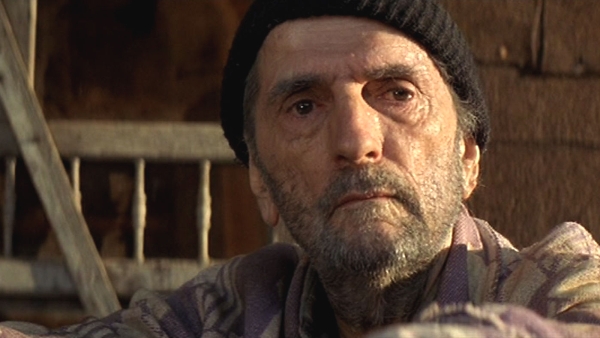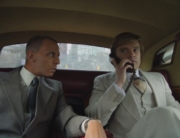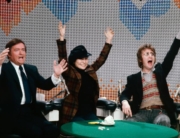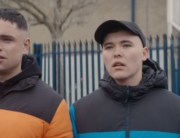Roger Ebert once noted that no film with character actor Harry Dean Stanton could be all that bad. This is just one acknowledgement of the quiet power that Stanton has had on screen for 60 years. David Lynch notes this too in the new documentary Harry Dean Stanton: Partly Fiction, that in role after role Stanton seems real. He is always present, actively engaged and listening to what the other actor is saying. And if he doesn’t say anything much, as in the first half hour of Wim Wenders’ Paris, Texas (which I’ll get to more in a moment), he can still convey so much emotion. “His face is a story,” says Sam Shepard. What a face, especially those little-big eyes.
Filmmaker Sophie Huber tries at first for a direct approach in finding out about Stanton’s background, and he’s resistant to talk about his past or his parents, but gradually he opens up, mostly through anecdotes. We learn that his parents separated when he was young and that he was close to his mother, he went off to the Navy in the war, and came back to study in the theater. Ultimately, he much preferred films for the money and travel. In comparison, it was “not as much work.” He lived a couple years with Jack Nicholson right before Easy Rider hit, and Nicholson remains one of his closest friends (why he isn’t interviewed, I don’t know). He collaborated on six projects with David Lynch—one clip from The Straight Story is highly emotional and sensitive, and shows off the basic power of Stanton’s work (even in a relatively small role). Oh, and he sings too. A lot.
The film is shot and edited in a kind of cool, laconic, and almost meditative way with the requisite clips sprinkled throughout—and boy, what good ones: Alien, Repo Man, Cool Hand Luke, The Missouri Breaks, but don’t forget his stint on Big Love, Wild at Heart, The Last Temptation of Christ, and so many memorable cameos (noticed him in The Avengers last summer?). What one comes away with is that he’s a consummate professional and also a consummate loner, who has had his loves (one, Rebecca De Mornay, ran off with her co-star, Tom Cruise, during the making of Risky Business) and has never settled down. “My brain wasn’t wired like that, to be a part of any institution,” he notes. One senses the regret or sadness and also the acceptance and peace with this fact—he may even have a kid somewhere, he says, who knows. On YouTube there is a video floating about called “Harry ‘Zen’ Stanton,” and seeing this film one can see why.
Huber also gives much time for Stanton to sing gentle ballads, and he has a good voice even at age 86, and yet if there is a problem it’s that it’s almost too much of a good thing. The film runs short at 77 minutes and doesn’t run a minute too long really, but the songs puff it out. It’s a little wearying near the end.
The real highlights are the clips and the discussion from Paris, Texas director Wenders and writer Shepard about that film, and it’s fitting since it’s a masterpiece, featuring Stanton as a man who at the start of the film comes out of a desert, without a voice or much of an identity. Soon we come to learn about the man’s brother, about his son that he didn’t know he had or thought he lost, and the woman who got away (Natassja Kinski). When the actor, completely vulnerable, delivers a monologue near the end, it’s not just the words but all of the emotion that resonates (some of it possibly coming, as one can contextualize from the documentary, from his own life and lost loves).
Oh, and yes, Deborah Harry once wrote a song about Harry Dean Stanton and she sings a little bit of it here. Very cool.







Leave A Comment